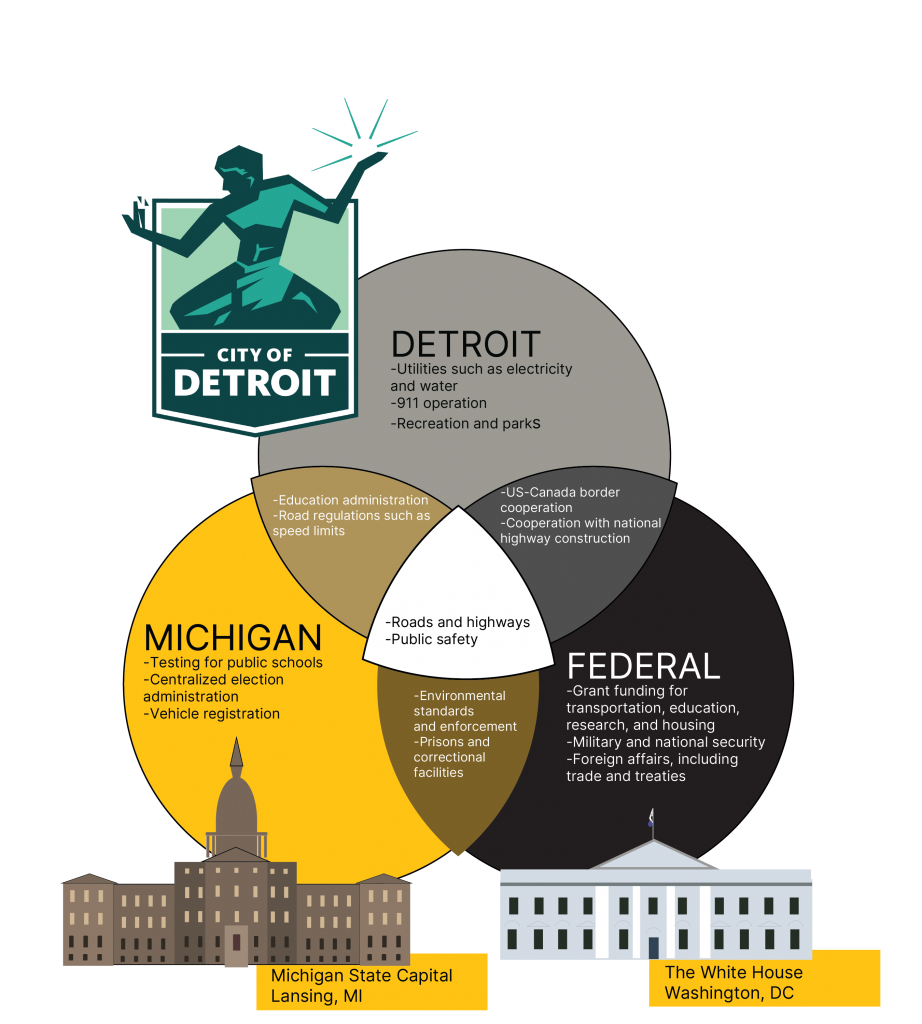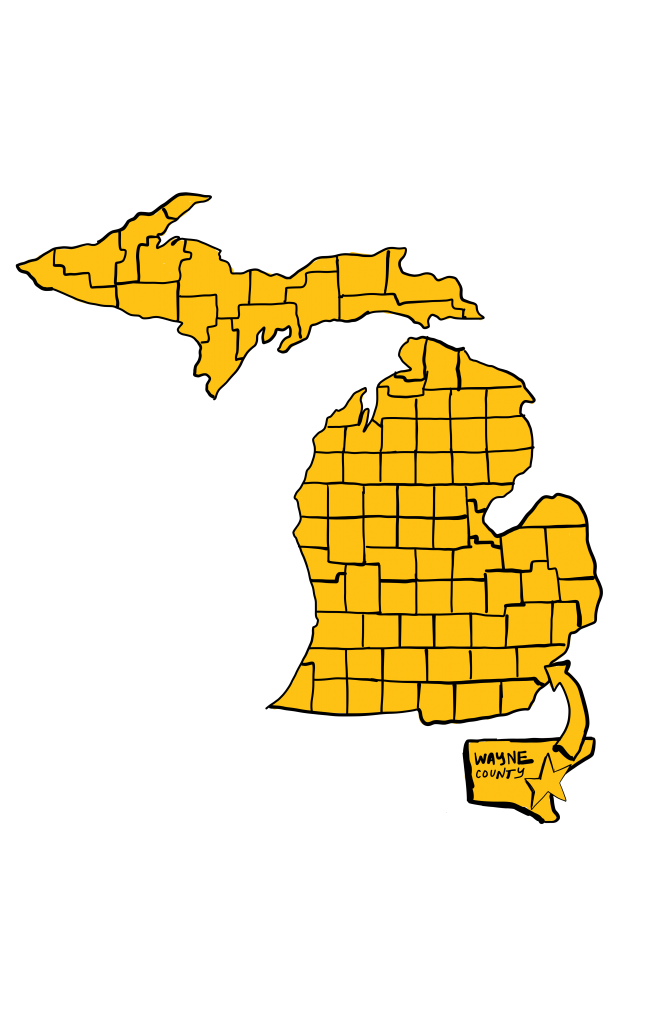Why Does This Matter?


As we mentioned in the previous lesson, being an engaged citizen of Detroit means being informed about our government and encouraging others to do the same.
We can better address problems in our communities if we know how our city interacts with the state and federal levels of government. As citizens, we also must consider how we personally interact with local, state, and federal governments. Government officials make decisions that continually impact our lives. With this awareness, we can engage government more efficiently to protect or improve the quality of our lives and our communities.
Connecting the Dots
Detroiters live within three levels of government –– local, state, and federal. Cooperation among these levels allows everyday life to run more smoothly. Even though each level has different powers, they must work together to serve the needs of our communities.
The concept of federalism helps us to better understand this relationship. Federalism refers to the ways local, state, and federal government cooperate to serve the public. In the United States, the U.S. Constitution is referred to as “the supreme law of the land,” meaning that federal law trumps all state and local laws. Each level of government must obey the Constitution and federal laws. Similarly, in Michigan, cities are subject to state laws in the same way. No law in Detroit can conflict with the Michigan Constitution, the U.S. Constitution, or laws from either the state or federal governments.
Federal and state governments share power in many ways, yet local governments must be granted power by the state. Here’s why: local governments in Michigan are creations of the State, meaning state constitutions allow local governments to take on some responsibilities of the state government. The City of Detroit can only take on powers the State allows it to. If the City oversteps the authority granted by the State, the State can remove its powers.
Our Three Levels of Government
Here are a few examples of where our three levels of government share responsibilities and powers!


Now that we know the services that the City provides from Responsibilities, it’s helpful to understand the ways that the City of Detroit interacts with the state and federal governments to help provide those services.
One way that Detroit interacts with the state and federal governments is financial. Cities like Detroit rely on the state and federal governments for money to complete projects. The federal government provides funds in the form of grants to help state and local governments carry out essential programs. The most common types of federal grants offered to state and local governments are categorical grants and block grants. Both types of grants can be used for specific programs, such as road construction, affordable housing, or pollution control however categorical grants must be used for very specific purposes and block grants can be used more broadly.
Equally important are the interactions between the City and State. The State of Michigan sets limits on the city’s powers and controls much of its money. Sometimes the State provides direct financial assistance. Other times, the State passes laws that establish the types of revenue the city can raise and the ways it may raise it. These laws can have a negative or positive effect on the city’s ability to generate money.
Another way that Detroit interacts with the state and federal governments is through regulation. The State of Michigan creates regulations for a variety of businesses that are headquartered in Detroit. For example, restaurants that are inspected by Detroit health officials must follow state laws. Employees in a Detroit factory are protected by state health and workplace laws.
Public education funding is a good example of how governments cooperate to serve the public. The federal government provides funding for education through programs like Title I, which considers the number of children from low-income families when granting funds, helping to ensure that all students meet the State’s educational standards. The State of Michigan, which sets state academic standards, also allocates money in its annual budget for public schools in the School Aid Fund. At a local level, school districts, responsible for operating the schools, can ask voters to approve a millage, or local property tax, that can help fund certain aspects of their work.
Not every issue is as complicated as public education funding, but you can see that all three levels of government work together to provide resources and support for important programs.
What about the county government?


We’ve talked a lot about city government as local government, but there are a few other players on the local government scene. Michigan is made up of 83 counties, each having its own government and within each are multiple cities. Detroit is in Wayne County, which includes more than 25 different cities and townships, including the Downriver communities, the Detroit Metro Airport, and the Grosse Pointes.
Similar to Detroit’s city government, Wayne County has an elected County Executive that leads the executive branch, and an elected Wayne County Commission that serves as the legislative branch, together with a few other elected officials, including a Prosecuting Attorney, Sheriff, County Clerk, and Register of Deeds.
In Responsibilities, we discussed Detroit’s 36th District Court. At the county level there are judicial responsibilities as well.
| Wayne County Third Circuit Court | The largest circuit court in Michigan and its judges are elected to six year terms.
|
| Wayne County Probate Court | Judges are elected to six year terms
|
County governments have a few other services that are similar to Cities as well –– they operate parks and recreation, public health, and economic development programming. The difference is that the County serves all county residents. Wayne County works with the City of Detroit to make sure their services meet the needs of Detroiters.
Did you know…
The Department of Homeland Security does more than national security. You may have heard of Homeland Security at the federal level when there are news reports about terrorism. But have you also noticed that you can see cars around Detroit with “Department of Homeland Security” written on them? That’s because there are also State and local homeland security offices. At the state and local levels, those departments are more focused on emergency response to disasters. The Detroit Homeland Security and Emergency Management Department does some work in public safety for large public gatherings and conducts surveillance, gathering information to assess the possibility of a threat. However, they primarily manage emergency notifications for the city, training emergency responders, and developing emergency response plans such as evacuation and adverse weather response. Warming centers in the winter and cooling centers in the summer are also initiatives from this department.
Lesson Review
Construct an argument about the impact of the state and federal governments on the City of Detroit using specific examples and relevant evidence from historical sources while acknowledging how citizens of Detroit were or are engaged on a specific issue.
